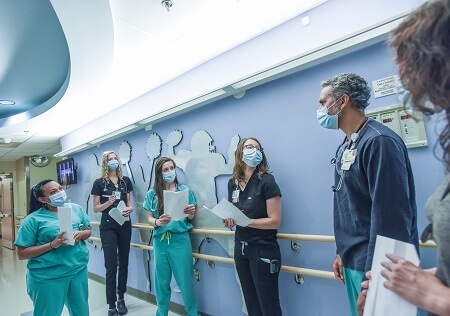Overview
The primary goal of the Carolinas Medical Center Department of Pediatrics is to train residents to become well-rounded general pediatricians who are fully prepared and confident to enter a subspecialty fellowship or a practice setting of their choice.
The large primary care base within Charlotte, NC, combined with our role as the regional referral center with all pediatric subspecialties for surrounding counties, exposes our residents to the full depth and breadth of pediatrics.
The curriculum provides balanced experiences at each level of training, aligned to ACGME recommendations and the six core competencies. Flexible tracks allow individualized experiences for all residents. Our award-winning faculty in the CAPE department and supportive research mentors offer numerous opportunities for scholarly activity throughout residency.
↑ Back to top
Yearly Schedule and Objectives
PL-1 Foundation year
The PL-1 curriculum lays the foundation across inpatient and outpatient rotations, caring for patients from premature neonates to late adolescents across a wide variety of subspecialties.
PL-2 Growing responsibility
PL-2 residents return to core rotations with supervisory roles, develop triage/management skills and broaden experience through additional critical care, subspecialty and an advocacy rotation.
PL-3 Senior leadership
PL-3 residents supervise across services (including PICU), refine teaching and assessment skills and individualize with elective months as they transition to practice or fellowship.
Clinical Rotations
| PL-1 Year | Months of Service | PL-2 Year | Months of Service | PL-3 Year | Months of Service |
|---|---|---|---|---|---|
| Rotation | Rotation | Rotation | |||
| Adolescent Medicine | 1 | Advocacy | 0.5 | Outpatient Clinic | 1 |
| Behavior/Child Development | 1 | Hospital Medicine | 2 | Hospital Medicine | 2 |
| Ambulatory Heme/Onc and Nephrology | 1 | Neonatal Intensive Care | 1 | Pediatric Emergency Medicine | 1 |
| Hospital Medicine | 3 | Outpatient Clinic | 1 | PICU | 1 |
| Neonatal Intensive Care | 1 | Pediatric Emergency Medicine | 1 | Team Nursery | 1 |
| Outpatient Clinic | 2 | PICU | 1 | Team Nursery | 1 |
| Pediatric Emergency Medicine | 1 | Subspecialty/Elective | 5.5 | Subspecialty/Elective | 5.5 |
| Team Nursery | 1 | Mental Health | 0.5 | Track Selection | Longitudinal |
| Subspecialty/Elective | 1 | Track Selection | Longitudinal | Mental Health | 0.5 |
Career-Focused Training
Residents will complete at least 40 weeks of individualized curriculum throughout the duration of their training with a minimum of 20 of these weeks being traditional subspecialties. Remaining elective time can be used for resident-designed experiences with a preceptor, such as school health, practice management, pediatric ultrasound, procedural training, residents-as-teachers, or research
↑ Back to topLongitudinal Tracks
Each resident selects a track early in PL-2 that spans the rest of training:
- Office-Based Ambulatory: Half-days with a community practice serving a distinct patient population from continuity clinic.
- Office-Based Subspecialty: Paired with a subspecialty preceptor or practice group; half-days through PL-2 and PL-3.
- Inpatient Care: Paired with an inpatient provider (e.g., Hospitalist, Intensivist); may include time at a community hospital.
- CARE (Advocacy): Immersive 2-week curriculum early in PL-2 plus longitudinal half-days to complete an advocacy project.
Continuity Clinic
Residents attend continuity clinic about one afternoon per week. Interns join day-based teams and receive a patient panel from neonates to age 18, fostering longitudinal relationships with families, peers and a consistent preceptor.
↑ Back to topDidactics
Academic Half Day
Every Tuesday, 12:30–4:30 p.m., residents are released from clinical duties for interactive didactics—allowing deeper engagement than a traditional noon conference.
High Value Care Conference
As PL-3s, residents present a mentored patient case at the monthly HVC conference, integrating diagnostic criteria and value-based management with quality, cost and value considerations.
Other Resident-Led Conferences
Over three years, residents lead Morbidity & Mortality, Ambulatory, multiple QI talks and Grand Rounds presentations.
Grand Rounds
Wednesdays, 7:30–8:30 a.m.: learners and faculty gather for reviews of current topics in medicine.
Rotation-Specific Conferences
NICU, full-term nursery, outpatient, PICU and inpatient teams meet on Monday/Thursday/Friday for targeted teaching.
Resident Board Review
Residents have access to AMBOSS and AAP PREP questions; all receive Nelson Textbook of Pediatrics for reference throughout training.
↑ Back to topElectives
| Electives Available to Pediatric House Staff | ||
|---|---|---|
| Adolescent Medicine | Gastroenterology | Otolaryngology |
| Allergy/Immunology | Genetics | Palliative Care |
| Behavior/Child Development | Hematology/Oncology | Pediatric Surgery |
| Blood and Marrow Transplant | Hospital Medicine | Pulmonology |
| Cardiology | Infectious Disease | Radiology |
| Cardiovascular Intensive Care Unit | Neonatal Intensive Care | Pediatric Rehabilitation |
| Child/Adolescent Psychiatry | Nephrology | Rheumatology |
| Child Maltreatment | Neurodevelopmental | Sleep Medicine |
| Dentistry | Neurology | Sports Medicine |
| Dermatology | Ophthalmology | Toxicology |
| Endocrinology | Orthopedic Surgery | Urology |
